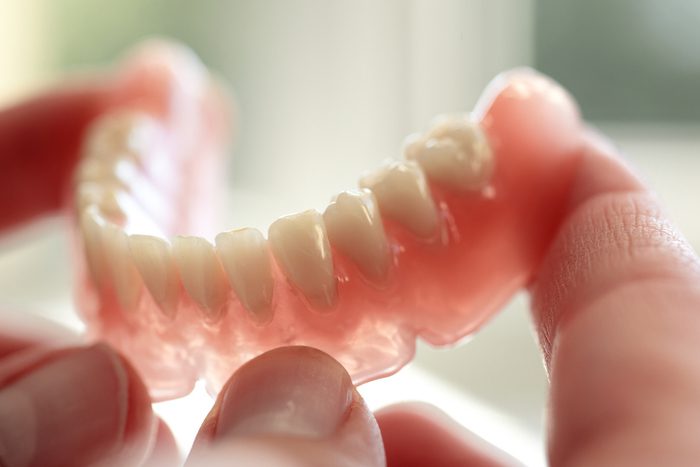Dentures and partials can be a great solution if you’re missing some or all of your teeth. These dental appliances help restore your smile, improve your ability to eat and speak and boost your confidence. Mill Creek Dental provides dentures and partials as part of our restorative dentistry services. We want to help you get your smile back.


Dentures and Partials in Canton, TX
Dentures are removable appliances used to replace missing teeth. There are two main types: complete dentures and partial dentures.
Complete dentures replace all the teeth in either the upper or lower jaw. They are typically made from acrylic resin and may include a gum-colored base. Complete dentures are custom-made to fit your mouth, ensuring they stay in place and look natural.
Partial dentures are used when you still have some natural teeth remaining. They consist of one or more replacement teeth attached to a metal or acrylic framework. Partials fill the gaps left by missing teeth and help keep your remaining teeth from shifting.
How Do Dentures and Partials Work?
The process of getting dentures or partials starts with an initial consultation. During this visit, your dentist will examine your mouth and discuss your needs. They will take impressions of your gums and remaining teeth to create custom dentures or partials that fit you perfectly.
Once your impressions are taken, they are sent to a dental lab where your dentures or partials are crafted. The lab creates a model that matches the shape of your mouth, ensuring a comfortable fit. When your dentures or partials are ready, you’ll return to the dentist’s office for a fitting. The dentist will make necessary adjustments to ensure your new appliance fits comfortably and functions well.
Using Your Dentures or Partials
When you first start using your dentures or partials, getting used to them may take a little time. Begin by eating soft foods and gradually introduce more variety as you get accustomed to your new appliance. Speaking with dentures or partials in place can also help improve your speech. If necessary, use denture adhesive to help keep your dentures or partials securely in place.
Implant-Supported Dentures
Implant-supported dentures are a modern solution for people who are missing multiple teeth. Unlike traditional dentures, which sit on top of your gums, implant-supported dentures are attached to dental implants. These implants are small titanium posts placed into your jawbone, providing a stable and secure base for your dentures.
The main benefit of implant-supported dentures is their stability. Because the implants are securely anchored in your jawbone, the dentures won’t slip or move around while you eat or talk. This means enjoying your favorite foods and speaking clearly without worrying about shifting dentures.
Another advantage is that implant-supported dentures help preserve your jawbone. When you lose teeth, the jawbone can start to shrink over time. The implants stimulate the bone, helping to keep it strong and healthy. This can also help maintain the shape of your face and prevent the sunken appearance that can sometimes occur with traditional dentures.
Implant-supported dentures also look and feel more like natural teeth. They are custom-made to fit your mouth, so they blend well with your natural teeth and look realistic. Many people feel more comfortable and natural compared to traditional dentures.
The process for getting implant-supported dentures involves several steps. First, your dentist will place the implants into your jawbone. After a healing period, during which the implants fuse with the bone, your dentist will attach the dentures to the implants. This process ensures a secure fit and a comfortable feel.
Benefits of Dentures and Partials
Dentures and partials offer many benefits that can improve your daily life. First, they help restore your ability to chew and speak properly. Eating your favorite foods and talking clearly can become challenging when you lose teeth. Dentures and partials fill in the gaps left by missing teeth, making it easier to enjoy meals and communicate confidently.
Second, dentures and partials can greatly enhance your appearance. Missing teeth can affect your smile and facial shape. Both complete dentures, which replace all the teeth in a jaw, and partials, which replace only a few missing teeth, help create a natural-looking smile. They support your facial structure and boost your confidence by giving you a full, attractive smile.
Another benefit is dentures and partials help prevent your remaining teeth from shifting out of place. When you lose teeth, the surrounding teeth can start moving toward the space, leading to bite problems and misalignment. Filling in the gaps, dentures and partials help keep your teeth in their proper positions and maintain a balanced bite.
Finally, dentures and partials are often cost-effective for replacing missing teeth. They provide a practical way to restore function and appearance without the higher costs associated with other treatments, like dental implants. This makes them an accessible option for many who need to replace missing teeth.
Caring for Your Dentures and Partials
To keep your dentures or partials in good condition and ensure oral health, brush them daily with a soft-bristled brush and denture cleaner. This helps remove food particles and plaque. After eating, rinse your dentures or partials with water to remove any food particles.
When you’re not wearing your dentures or partials, store them in a denture-cleaning solution or water to prevent them from drying out. Regular dental check-ups are also important. During these visits, your dentist will monitor the fit and condition of your dentures or partials and make any necessary adjustments.
Common Concerns and Solutions
It’s normal to experience discomfort or soreness when first wearing dentures or partials. This usually improves as your mouth adjusts. If you have persistent pain, contact your dentist for an adjustment.
Eating with dentures or partials can take some practice. Start with soft foods and gradually try more challenging items as you become more comfortable. If you continue to have difficulty, your dentist can help with adjustments.
You may notice changes in your speech when you first start using dentures or partials. Practice speaking and reading out loud to help improve your pronunciation. Most people adjust to speaking with their dentures or partials over time.
Frequently Asked Questions
Can I fix an underbite with dentures?
Yes, dentures can help correct an underbite to some extent by adjusting the alignment of artificial teeth. However, the degree of correction depends on the severity of your underbite. Your dentist will evaluate your case and design the dentures to improve function and appearance.
Can I get dental implants after having dentures?
Yes, you can switch to dental implants even after using dentures. Tooth implants can provide a more permanent and stable solution. However, if you’ve experienced significant bone loss, you might need a bone graft before implants can be placed.
Are there any foods I should avoid with dentures?
Yes, you should avoid sticky foods like gum and caramel. Hard foods like nuts or hard candies are also not good dentures. Tough meats and foods with small seeds can also be difficult to chew and may irritate your gums. Sticking to softer foods can make eating more comfortable and protect your dentures.
Can my dentures be whitened?
No, dentists cannot whiten dentures like natural teeth. They need proper cleaning and maintenance to prevent staining. We can professionally clean your dentures to remove surface stains; if they’re very discolored, you might need new ones. Regular cleaning at home helps maintain their original shade.
Can I switch from traditional dentures to implant-supported dentures?
Yes, you can switch from traditional dentures to implant-supported dentures. Implant-supported dentures offer greater stability and comfort, preventing issues like slipping. Your dentist will assess your bone density and oral health to determine if implants are a good option for you.
Will my dentures stay in place without adhesive?
Well-fitting dentures should stay in place without adhesive. However, changes in your gums and jawbone may affect their fit over time. If your dentures start to slip, adhesives can provide temporary stability, but adjustments or a reline may be necessary for a better fit. Regular dental visits can help maintain proper denture fit.
Is a Denture or Partial Right for You?
Dentures and partials can be an excellent solution if you’re missing several or all of your teeth. They offer a way to restore your smile and function, helping you enjoy life to the fullest. Call our office or schedule an appointment online to get started.
